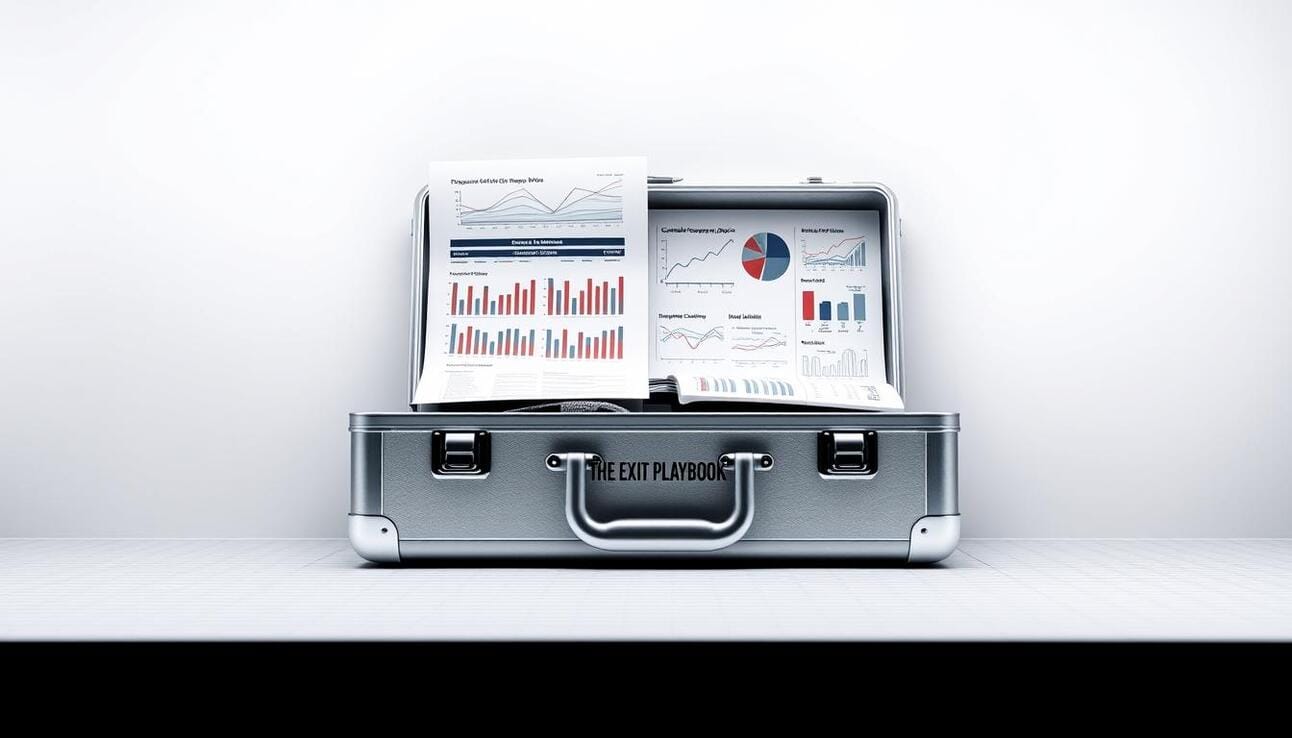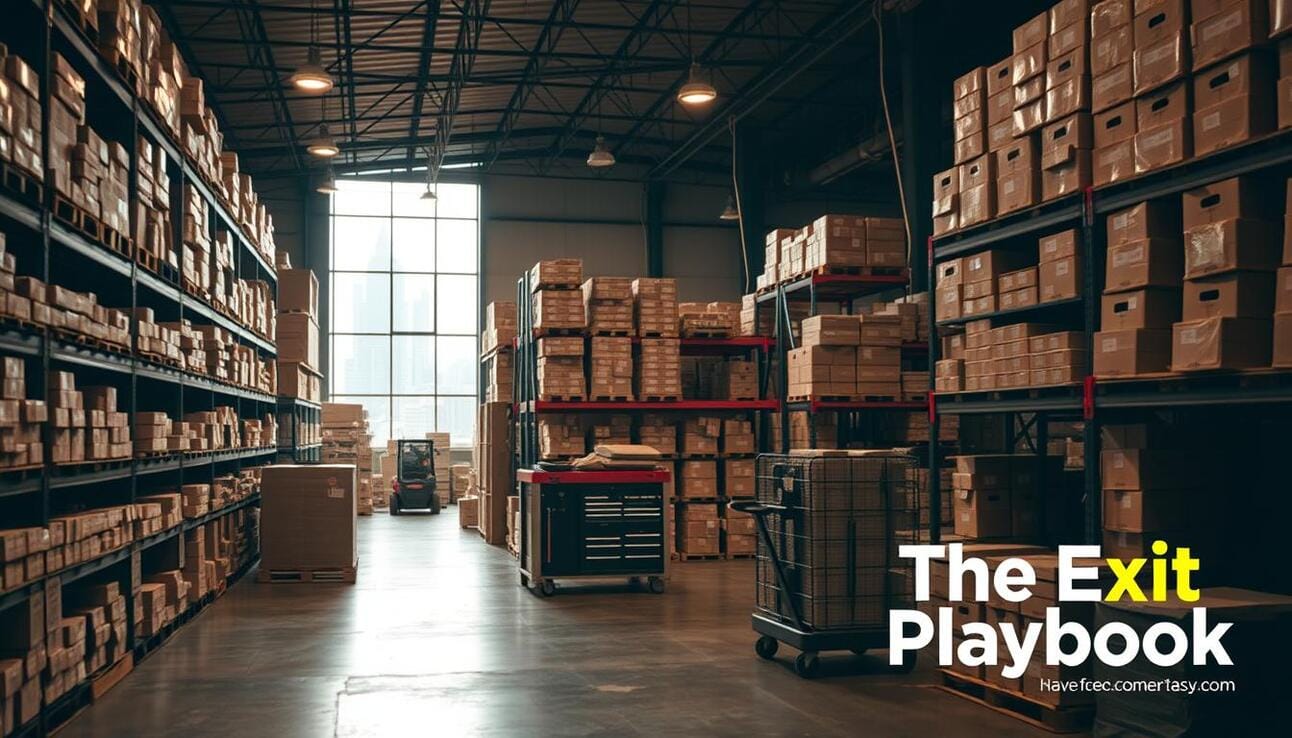
Let’s get real: Most founders treat their business like a garage sale—pricing it based on dusty equipment and last year’s revenue. But here’s the secret buyers won’t tell you: Your “boring” playbooks and customer rants are worth more than your entire warehouse.
I’ve seen HVAC companies sell for 8x profits because of a training manual, SaaS tools land $45M exits for “boring” data, and bakeries turn delivery logs into half-million-dollar licensing deals.
This isn’t luck. It’s strategy.
Here’s how to find (and weaponize) the assets your accountant ignores—so you can stop leaving money on the table.
Asset #1: Your “Boring” Playbooks (Yes, Even the Toilet-Unclogging One)
Why buyers care: Documented systems = predictable profits.
Case Study: “Drain Heroes Plumbing”
Sold for 7x EBITDA (not revenue) because their “How to Handle Angry Homeowners in 5 Minutes” script reduced cancellations by 40%.
Their secret? A 12-page PDF even their 65-year-old field manager could follow.
Your Move:
Record one SOP this week (film yourself doing a task on Loom).
Add a “Why This Matters” section (e.g., “Skipping Step 3 costs us $2,800/month in callbacks”).
Slap a price tag on it.
Pro Tip: Buyers don’t pay for your products—they pay for your predictability.
Bonus Example: The Coffee Shop Chain
Added $2.2M to their valuation by trademarking their “Crappy Day Survival Blend” (yes, really).
Their playbook included:
A 3-step guide for calming hangry customers.
A latte art template even interns could replicate.
The Long-Term Benefits of Systems
Think about this: A well-documented system doesn’t just help in the short term for an exit—it’s the secret sauce for building a sustainable business. Buyers love it, but more importantly, your business will run smoother with less oversight. That means more time for you to scale, pivot, and maximize your profits after you cash out. It’s not just about selling—it’s about building a brand that thrives with or without you.

Asset #2: Your Rolodex of Superfans (The Ones Who’d Buy Your Trash)
Why buyers care: 1 loyal customer = 10x the value of a one-time buyer.
Case Study: “InvoiceIQ”
Landed a $22M offer after proving 72% of clients auto-renewed yearly.
Their “magic”?
Tracked which users cursed during onboarding (“This sucks!” = red flag).
Fixed pain points, then turned happy clients into case studies.
Your Move:
Calculate your Customer Lifetime Value (LTV). If it’s under 3x acquisition cost, fix it.
Send your top 10 clients a “Rate My Business” survey (offer a $50 Amazon gift card for honesty).
Turn their praise into a “Why We’re Awesome” slide deck.
Pro Tip: Buyers aren’t buying your code or widgets—they’re buying your addicted customers.
Retention > Revenue
It’s not just about having customers—it’s about keeping them. Think of your customers like a Netflix subscription: It’s all about the recurring value, not just the initial sale. Retention is where the magic happens, and buyers know that loyal clients give them a predictable stream of revenue for years to come.
Asset #3: The “Useless” Data You’re Sitting On (Yes, Even Your Slack Rants)
Why buyers care: Your chaos is their goldmine.
Case Study: “Dough & Co.”
Turned 3 years of delivery delay logs into a $500K licensing deal with DoorDash.
Their “aha” moment? Realizing their “Why Trucks Are Late” spreadsheet exposed industry-wide delivery gaps.
Your Move:
Mine your CRM for patterns (late payments? Seasonal dips?).
Bundle insights into a report (“2024’s Biggest Delivery Fails—And How We Fixed Them”).
Pitch it to vendors, competitors, or… DoorDash.
Pro Tip: Data is the new oil. But unlike oil, it’s free—and you’re swimming in it.
Data as a Revenue Stream
Data isn’t just for “big” companies. It’s for anyone who knows how to use it. Whether it’s customer behavior, operational inefficiencies, or even simple product trends, data has the potential to create an entirely new revenue stream. Imagine licensing your data insights to competitors or vendors who could use them to optimize their own business. The possibilities are endless—and it costs you nothing but a little organization.

The 4-Step “Buried Treasure” Audit (Steal This)
List every “boring” system you’ve built (even the “How to Reset the WiFi” doc).
Track retention like your retirement depends on it (spoiler: it does).
Ask employees: “What do we do daily that competitors would kill to know?”
Package it like Netflix:
SOPs → “How-To” guides ($997/each).
Data → Industry reports (license it).
Superfans → Case studies (brag about them).
The “Starbucks Barista” Blueprint
Starbucks’ barista program slashed turnover by 24% because:
Training was gamified (badges, rewards).
Every latte art failure was logged and turned into a lesson.
Your shortcut: Steal their playbook and tweak it for your team.
Real-World Proof (No MBA Required)
The HVAC Hero: Sold for $14M because his “Angry Homeowner” script was 10x sexier than his trucks.
The “Boring” SaaS Tool: Landed a $45M offer after licensing their data labeling system to Tesla.
The Retail Rebel: A niche bookstore sold for 5x revenue by proving their “Book Recs From Hell” email list had a 60% open rate.
Why 93% of Founders Fail This (Don’t Be Them)
Most owners make two mistakes:
They think “value” = revenue. Wrong. Value = scalable predictability.
They hide their chaos. But buyers want to see your mess—as long as you’ve got the playbook to fix it.
Your antidote: Be the Swiss Army Knife of your industry. Documented systems + addicted customers + data insights = buyer FOMO.
The “We’re Too Small” Myth
A $400K/year landscaping biz sold for 3x revenue by:
Packaging their “Snowstorm Response Protocol” as a $5K course.
Licensing their client onboarding checklist to HomeAdvisor.
Lesson: Size doesn’t matter—systems do.
Your Next Move
📥Free Download: “The 10-Minute Valuation Hack Sheet” (steal our exact audit checklist) https://bit.ly/ValuationHackSheet. Or: Keep doing what 87% of founders do—leave millions on the table and blame “market conditions.”
FAQ (Because Skeptics Gonna Skept)
Q: “But I’m a solo founder—can this work for me?”
A: Yes. A freelance SEO consultant sold her one-person biz for $1.2M by packaging her keyword research templates and client onboarding videos.
Q: “What if my industry is ‘too traditional’?”
A: A 100-year-old printing press sold for 12x EBITDA by licensing their “How to Schmooze Boomer Clients” playbook to rivals.
Q: “How do I prove my data’s worth?”
A: A car wash chain turned 5 years of “Peak Hours” data into a $300K consulting gig for gas stations.
Final Thought
Your business isn’t a spreadsheet—it’s a story. Buyers don’t want your chairs; they want your chaos-taming superpowers. Now go dig up your buried treasure.
Disclaimer
The content provided in this article is for educational purposes only and should not be construed as financial, investment, or legal advice. The information shared is based on general industry knowledge and personal experience. Always consult with a qualified professional before making any financial decisions. The author and publisher of this article do not accept responsibility for any actions taken based on the information presented.
